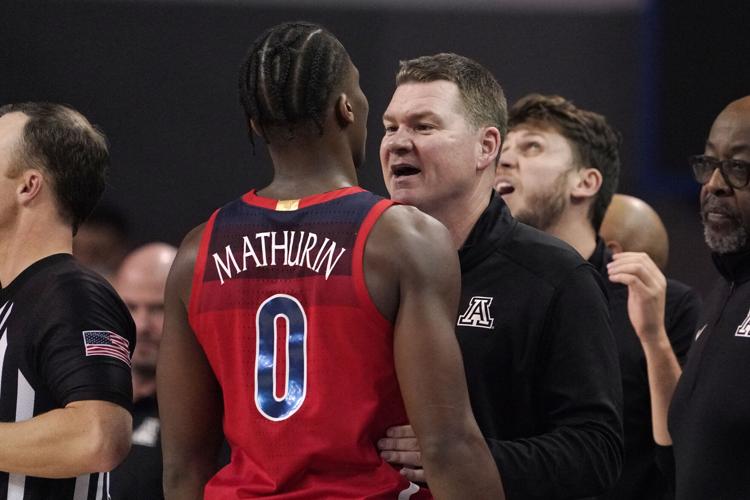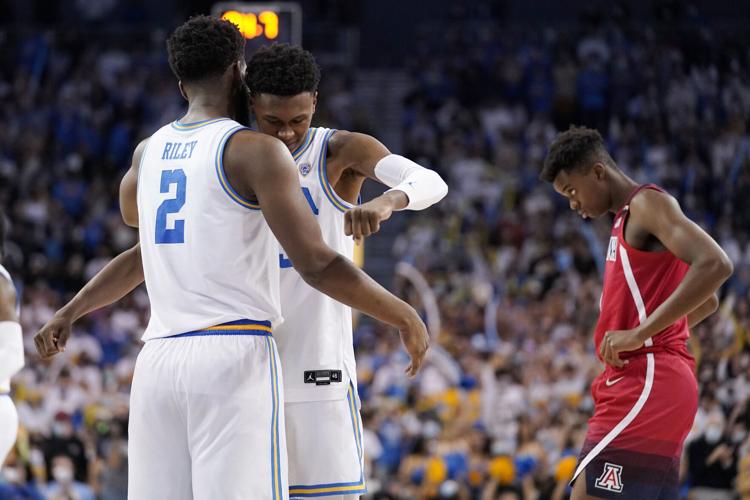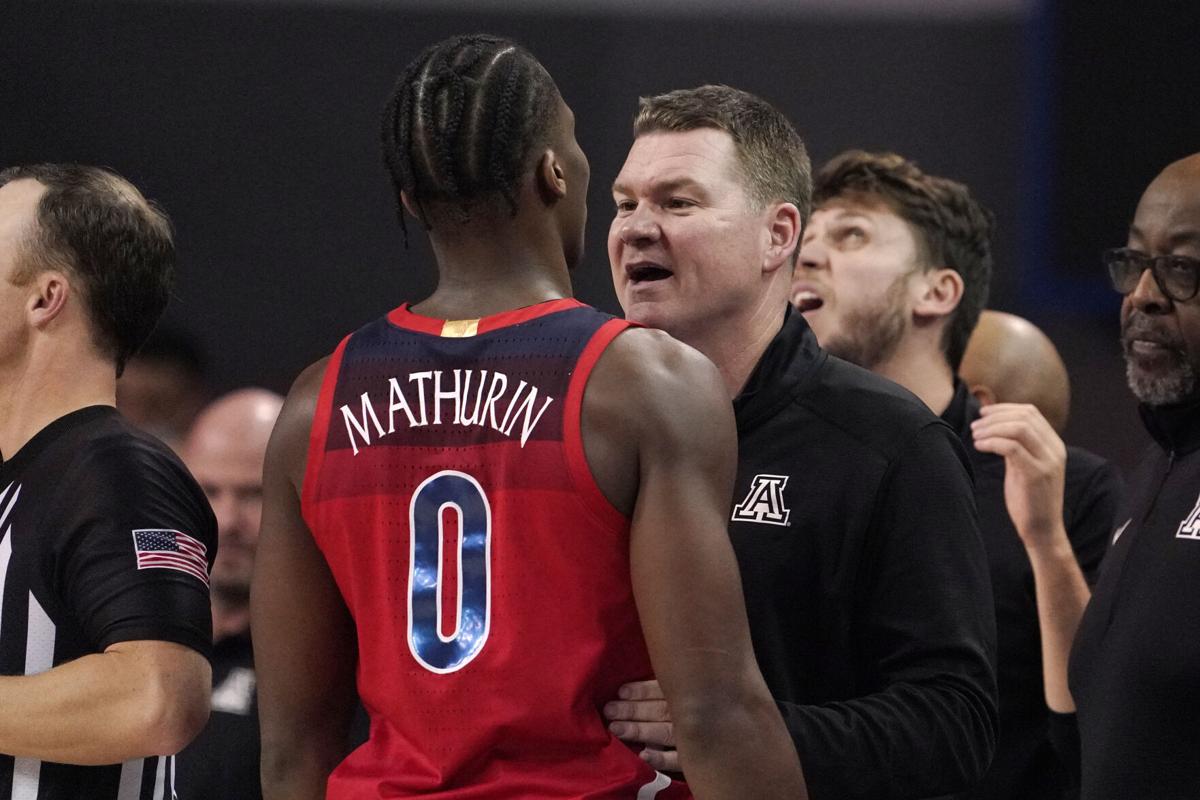LOS ANGELES — Tommy Lloyd took a seat in a Pauley Pavilion corridor, looked up at an small cluster of reporters and listened to probably the most difficult string of questions he’s faced all season.
What happened to the Wildcats’ offense, which shot just 30.7% in a 75-59 loss at UCLA?
Why couldn’t they better contain the Bruins’ 50% shooting?
Why didn’t Azuolas Tubelis start?
Is Kerr Kriisa trying too hard in big games?
Or were his guys just worn out at the end of a three-game road trip?
The questions didn’t have to be that way. All the Wildcats had to do was play the Bruins in early or mid-November.
Back in those pre-Omicron variant times, UCLA was known as the team that returned everybody from a Final Four appearance, then added a McDonald’s All-American (Peyton Watson) and a rim-protecting transfer (Myles Johnson). They were talented, deep and experienced, a consensus pick to win the Pac-12 and a national title contender.
Then there was Arizona, which had flipped over half its roster, losing an all-league point guard in James Akinjo, while bringing in Lloyd as a first-time head coach. There wasn’t a whole lot of depth behind a promising core of sophomores, either.
The Wildcats were unranked at the start of the season, and picked to finish in a fourth-place tie in the Pac-12 alongside Oregon State.
Arizona coach Tommy Lloyd talks following the UCLA loss on what went wrong for the Wildcats. Video courtesy Arizona Athletics.
At that point, a 16-point Bruin victory margin at Pauley wouldn’t have been a surprise. Instead, thanks to Arizona’s quick rise to a No. 3 ranking and a long COVID-19 pause that put the Bruins somewhat under the radar and out of rhythm, the Wildcats were considered the favorites on Tuesday.
“UCLA is a really good team,” Lloyd said. “They might have lost one or two games early and people ... whatever. The next shiny object they’re focused on. But that team is going to be there at the end, I promise you.”
The Wildcats were the shiny object, and Lloyd could take credit for that. Or the “blame” for raising expectations.
But he wouldn’t.
“I don’t even think like that,” he said. “I mean, listen: We got beat by a really good team that played well tonight, and we didn’t play well.
“But I’m not worried about being victim of success, or all these hypotheticals. We got beat today. It’s part of the process. We’re going to learn from it and go forward.”
The Wildcats put up by far their worst shooting percentage and scoring output, having shot worse than the 40.6% they put up against NAU in the season opener and scored less than they did in a 76-55 win over Colorado on Jan. 13.
As he can be when times are good, Kriisa was a focal point of that offense. He missed all 12 shots he took, nine of which came from 3-point range, and had four turnovers to his six assists.
Combined with games at Illinois and Tennessee, Kriisa is a combined 5 for 27 from 3 (18.5%) over the Wildcats’ three big road games.
Arizona Wildcats wing Bennedict Mathurin addresses his struggles against the Bruins and how UCLA took advantage of UA's missed shots. Video courtesy Arizona Athletics.
Lloyd was asked if it was a coincidence that Kriisa hasn’t shot well in those games.
“I think you’re overthinking it,” Lloyd said. “Kerr is a tough kid. He didn’t play well today. When you’re a good, aggressive player, you’re gonna have nights like that.”
Lloyd said Kriisa wasn’t the only one who struggled, but he is the Wildcats’ most vocal and demonstrative player.
Was he trying too hard in this spotlight, a top-10 showdown carried on ESPN?
“I don’t think so,” Lloyd said. “I mean, I don’t know. I think they’re a really good defensive team. They probably had him a little off his rhythm a little bit. He probably had some open shots he’s been making all year that he didn’t. I don’t think it’s anything more complicated than that.”

UCLA forward Cody Riley, left, and guard Peyton Watson, center, embrace while Arizona guard Adama Bal walks away as time runs out on Tuesday's game.
Lloyd could have blamed it all on having to play UCLA at the tail end of a week-long road trip through California that began on Jan. 19, when the Wildcats flew to the Bay Area to prepare for Stanford.
He didn’t do that, either.
“We’re fine,” Lloyd said. “The guys are rested, well taken care of. We just came out and had one of those nights. This had a lot more to do with playing at UCLA than everything that happened before.”
The only guy who apparently wasn’t all that great physically was Tubelis. For the first time, Lloyd indicated that the left ankle sprain Tubelis suffered against Stanford was significant. He sat out Tubelis on Sunday at Cal and didn’t play him until eight minutes into Tuesday’s game.
“’Zu’ hadn’t done anything since Thursday and I didn’t know how he was gonna be, so I didn’t want to put a ton of pressure on him to start the game,” Lloyd said. “I mean, he had a real injury. Our trainer, Justin Kokoskie, did a great job getting him ready and for him to give it effort and play decently, I’m proud of him. It shows a lot about his character.”
Tubelis finished with eight points and six rebounds in 15 minutes, but was part of a UA defense that couldn’t stop UCLA inside or outside much of the night. The Bruins shot 47.1% from 3-point range and 51.1% from two, with versatile wings Johnny Juzang and Jules Bernard each scoring 15 points to lead the Bruins.
UA wing Bennedict Mathurin said the Wildcats could have prepared better for UCLA’s isolation plays, and Lloyd said the Bruins managed to finish better at the rim than other opponents have.
“They get credit for that,” Lloyd said. “We’ll go back and watch the film and figure out why.”
They’ll have just over a week to do so. Arizona will host rival Arizona State on Saturday, and then those same Bruins are scheduled to show up at McKale on Feb. 3.
Maybe the quick turnaround is a good thing for the Wildcats. Or maybe not.
“I don’t know,” Lloyd said. “The first thing is, obviously, they shot 50% and we shot 30% We probably start with that. We’ll try to make adjustments and hopefully play better the next time.”






